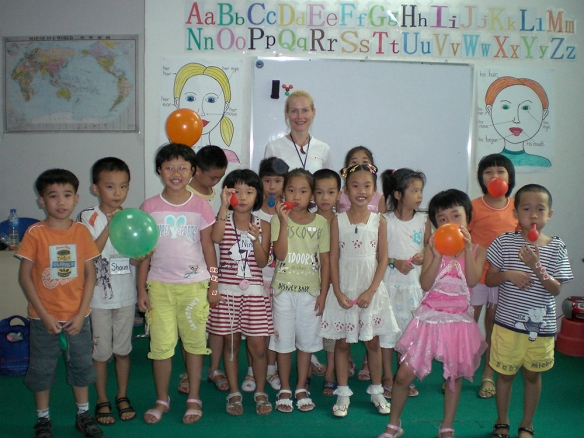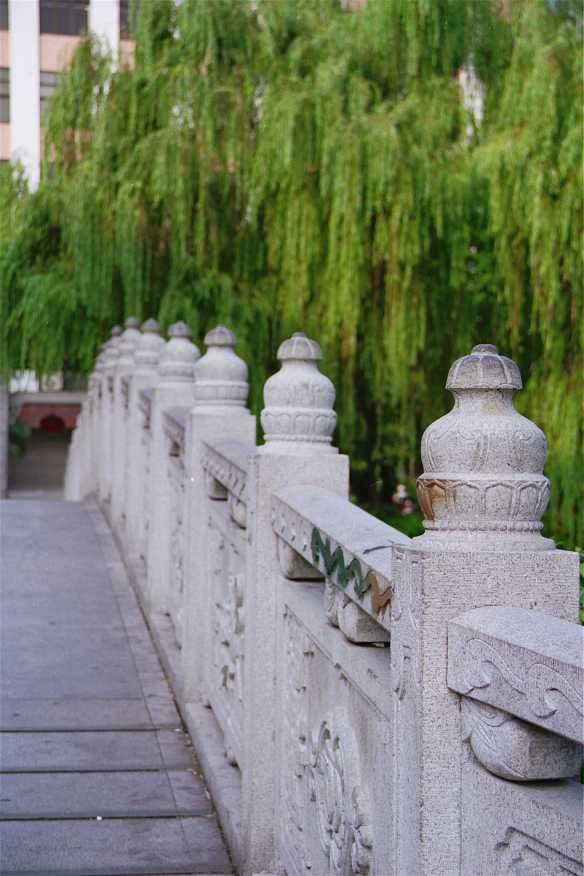‘Have you ever eaten dog?’ asks George, a student in Business English, a class of mixed-level speakers.
‘Umm, no, I don’t think so. I’ve never ordered it in a restaurant.’ How has he deviated from writing letters of introduction to dog meat?
‘Do you eat dog in Australia?’ he continues.
‘What about cats?’ comes a call from the back.
‘No. We don’t eat cats or dogs in Australia.’
My normally reserved class unfurls a string of questions and comments: Do you catch pigeons or birds in the park, to eat? What about snake? Why don’t you like dog? It tastes good. Dog is good to eat now in the wintertime; it’s very warming.
‘Sonja, why don’t you eat dog in Australia?’ It’s George again.
‘Well, because we keep dogs and cats as pets.’
Consternation wrinkles their faces.
‘Pets are special to us. We love them like members of the family. Ming bai ma?’
A discussion, in Chinese, ping-pongs around the classroom. George concentrates as he speaks, ‘So, it’s your Western sense of connection to these animals as… surrogate children… that makes the concept of eating them… abhorrent.’
‘Dui la.’ That’s right.
‘Ahh,’ is the group response.
‘Any more questions? Yes, Jenny?’
‘I don’t understand the exercise on page fifty-two.’
***
Everyone stare, stare, stares at my ‘yellow’ hair. Strangers on the street photograph me, the waiguoren, with their mobile phones. I’m in a clothing store, browsing, when a woman shoves her phone in my face and takes my picture. As I complain to Ash, she turns around and says, ‘Yes, I took your picture!’ In English. I loathe this imposed celebrity-status. I long to be inconspicuous, invisible.
***
I can now tell the time, buy shoes and clothes, book a massage and say ‘I am not an American’ in Mandarin. Ash has started speaking Chinese in his sleep.
***
Walking home after work one day, I look up, stop and stare. Orange and pink fairy floss clouds are teased across a deep blue sky. It’s the first sunset I’ve seen in over a year.
***
There’s no pollution in Kunming, the capital of Yunnan. At the Pagoda of the East Temple, groups of elderly people play heated games of mahjong while outside the Yuantong Temple, the 1200 year-old Buddhist complex, a sea of beggars is sprawled and prostrated on the footpath, and at the street market there are chickens dyed green, red and yellow, buckets seething with beetles, and a man makes edible art out of caramelised sugar.
The next day Ash and I explore the matriarchal town of Dali, where the women dress in long dark blue trousers topped by a royal blue long-sleeved tunic. I buy some bright, hand-dyed and painted wall hangings and we eat yak cheese pizza and yak meat stew.
The bus north, to Lijiang, climbs steadily higher through to a landscape of deep oranges, ochres and browns to tiered, terraced farms and green fields dotted with cattle and yaks. A maze of hutongs and cobbled streets, Lijiang old-town sprawls out, over and down a rambling hill. In the distance snow-covered mountains add a romantic touch.
We take a taxi to Shuhe, an ancient town now turned tourist theme park, which sits on the old tea trading route that ran from the south of Yunnan all the way to Lhasa, in nearby Tibet. Once a prosperous town, Shuhe is now known as the place where the beer is kept cold in baskets submerged in the gurgling canals, which crisscross the village.
Zhongdian, renamed Shangri-La in 2001 after James Hilton’s Lost Horizon, is just another concrete block box-style town with a road running down the middle. The taxi to Ganden Sumtseling, a 300-year-old Tibetan Monastery, bounces along a dirt track past farmhouses, woolly cows, fat black pigs and a shaggy white yak. A flat plain, the colour of honey and dark chocolate, rolls off into the distance. The monastery rooms are decorated with prayer flags, silk scarves, tapestries and intricate murals depicting Buddha’s journey to enlightenment; monks in burgundy robes, which flap and flutter in the wind, pad softly past on leather sandals.
***
Our second year at Lingdong over, Ash and I decide that it’s time to move on. We accept a position at Ben’niu Senior High School, where we will teach with two other Western teachers. A small town three hours west of Shanghai, Ben’niu has only one very long main street, which is lined with cheap restaurants, hairdressers, several supermarkets, and stores selling pipes, paint and other industrial products. Everything is covered in a thick layer of black grime. Unlike Foshan, there are no parks and no trees lining the streets. Buses crammed with people and trucks overloaded with aluminium products or coal roar down the main street, horns blaring.
***
I push the last desk into position. Instead of neat, precise rows there are now five groups of desks spaced around the edges of the room leaving the centre free for activities. The bell rings and a group of teenage girls knock and ask if they may enter. I smile and wave them in. More students trickle in through the door. A whispering huddle forms in the centre of the room.
‘What’s wrong?’
‘Where do we sit, teacher?’ one girl asks shyly.
‘Anywhere you like.’
Squealing with delight, they race for various tables.
When I ask what they are interested in, what they want to learn about, eager hands fly up, arms straight, fingertips wiggling. When I turn on music and play a game of ‘hot potato’ as an icebreaker, they cheer each other on.
All week the students bound like excitable puppies into my classroom.
I’m going to like it here.

View from Ganden Sumtseling, the 300-year-old Tibetan Monastery






